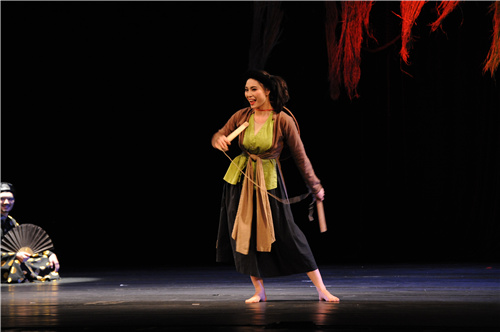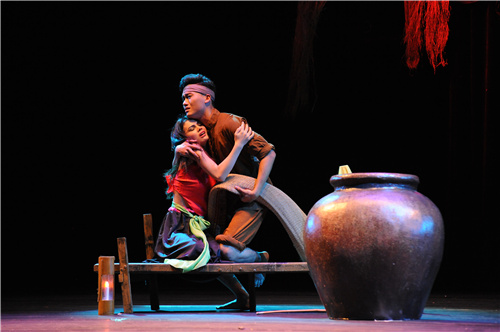
Director: Kieu Minh Hieu
Institution: Hanoi Academy of Theatre and Cinema, Vietnam
Venue: Experimental Theatre
Time: 13:30-14:30, May 20, 2014
Event: The 1st World Theatre Education Convention with 3rd Asian Theatre Schools Festival

Director’s Notes
“Vindicating for Ms. Mau” was inspired from an ancient script of Cheo (Vietnam traditional operatte) named “Quan Am Thi Kinh” with the main content is to “vindicate” for Ms. Mau with the guilt “pregnant without a husband”. The performance has been becoming the symbol of free in love, which is against the hard rules of the Feudal era. According to the Feudal’s rule, the women could not choose their love, but had to obey the “Three subjections, four virtues”. Ms. Mau does not agree with her father’s arrangement, and she dares to make love with her servant, consequently she gets pregnant without a husband, which is against the rules and virtue of Confucianism. However, in the performance, the audience can see the desire of many women in the Feudal age who were looking for love. The subject: “Vindicating for Ms. Mau” will be explained in modern eyes; it is the courageousness to express love.
The performance is not only modern but also traditional for Vietnamese folk with the village culture from music, decoration, costumes to dialogues. It guarantees to bring the soul of Vietnamese culture, which shows the beauty of Vietnam traditional theatre, but contains contemporary characteristic.

Synopsis
“Vindicating for Ms. Mau” (Giai oan thi Mau) is the performance which author Le Chi Trung inspired from the ancient traditional drama script named “Quan Am Thi Kinh”. The performance explains the unjust accusation of Ms Mau by a new and modern point of view.
At the beginning, Ms Mo is travelling around the village and gossiping about an event that the Richman is opening to find a husband for his daughter, named Ms. Mau. Because of the womanly beauty, Ms Mau is deliberately accused of being lascivious so that she cannot get married. Naturally, the Village Mayor who is very old, lascivious, and lusts for Ms Mau, knows about this event; so he tries to make approaches to become the Richman’s son-in-law. However, his proposal was turned down.
The dramatic situation starts to happen. In a beautiful moonlit night, Ms Mau went to the village’s well to have a bath. She realised that No, who is her family servant, and likes her, went after her. Because Mau felt a vindicate hatred for village men’s attitude, she intentionally expressed as a lascivious woman to get to know No’s attitude to her. No was so warm-hearted that she gave herself up to him. After that night, No and Mau have overcome the society’s prejudice about people’s condition to love each other.
As a result of this hard love, Ms Mau is pregnant. The Village Mayor knows that so he goes to the Richman’s house to impose a fine on them to “shave their heads and mark with lime” according to the village’s law. In addition, he wants to take revenge and make money. The Village Mayor bargains with the Richman but impossible, so he orders to arrest and rope them at the village’s Communal House. At there, Mau understands and feels the true love that she has been finding for a long time; it is No.
For protecting love and struggling to the severe laws of the Feudal society, Mau has made up a plan. She understands well the weak point of the Village Mayor that he is lascivious; Mo and Mau create a trap to accuse the Village Mayor of raping women. In order to make this calm and not to let the senior Mandarin know, the Village Mayor has to agree that Mau was not pregnant without husband.
This play is a drama which expresses deeply Vietnamese folk with the village’s culture. However, this performance also has the modern characteristics because of the way the author Le Chi Trung setting up the events and directing the play.
Running Time: 60 minutes

